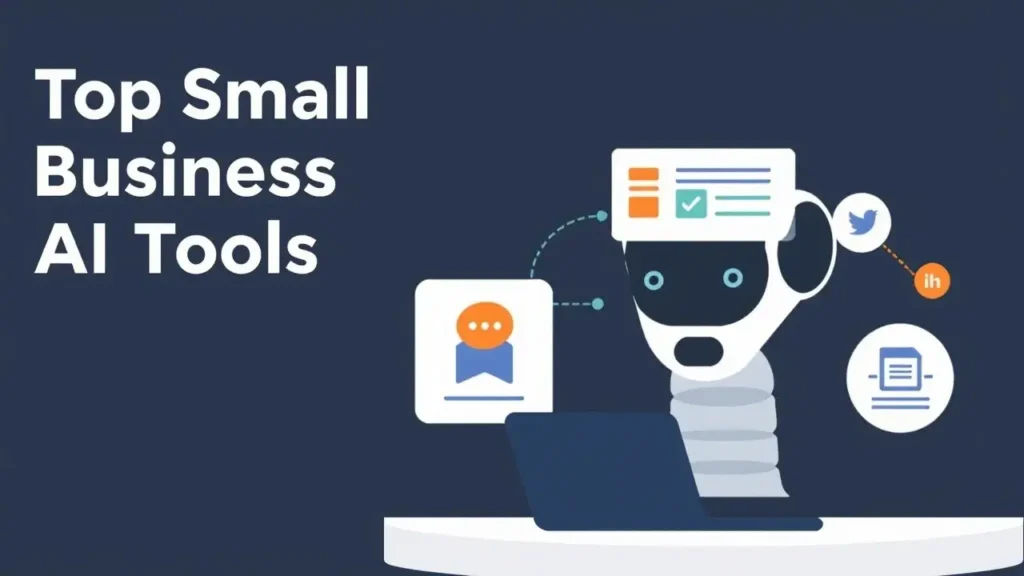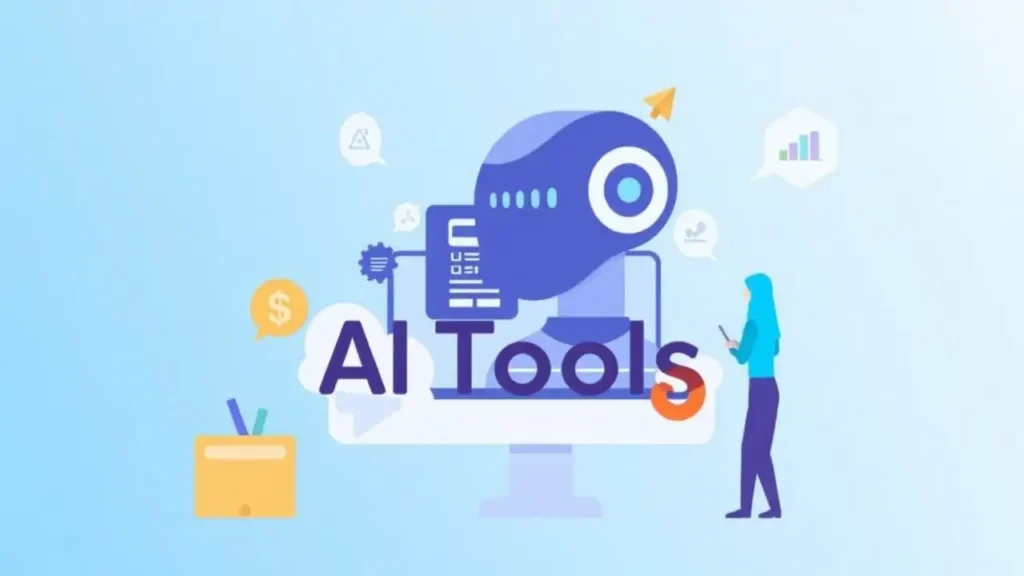today our article is about small business AI tools, why? because running a small business comes with countless challenges—tight budgets, time constraints, and fierce competition. But what if we told you that artificial intelligence (AI) could provide you with the actionable insights, efficiency, and automation needed to help your business compete at a higher level? Small business AI tools, deemed exclusive to large enterprises, are now becoming accessible to small businesses, empowering owners to streamline operations, improve decision-making, and drive growth.

This guide will help you explore the Top Small Business AI Tools available for your small businesses, offer step-by-step advice on choosing the right solution for your needs, and uncover how real businesses are reaping the rewards of integrating AI into their workflows.
Table Of Contents
- 1 Why Small Businesses Need AI?
- 2 What are the top small business AI tools?
- 3 How to Select the Right AI Tool for Your Business
- 4 Real-World Examples of AI in Action
- 5 How to Integrate AI Into Your Workflow?
- 6 What’s Next for Small Business AI Tools?
- 7 Frequently Asked Questions About Small Business AI Tools
Why Small Businesses Need AI?
AI is no longer just a buzzword; it’s a critical tool for businesses aiming to stay competitive in an increasingly fast-paced market.
Entrepreneurs and small business owners are turning to AI to streamline operations and gain a competitive edge.
AI can improve efficiency in areas such as inventory management, where tools can predict demand and prevent overstocking or shortages, and marketing, by analyzing customer data to craft personalized campaigns that drive engagement and sales.
It’s also transforming customer support with automated chatbots that provide 24/7 assistance and speeding up financial processes like invoicing and expense tracking.
Dr. Alex Chen, from AI Innovations, Inc., puts it perfectly, saying, “AI tools are the game-changer for small businesses, offering unprecedented insights and automation that were once exclusive to larger enterprises.
” These tools allow small businesses to make data-driven decisions, adapt to customer needs faster, and ultimately save time and resources.
By leveraging small business AI tools, small businesses can overcome traditional limitations such as limited budgets and manpower, empowering them to operate smarter, not harder, and scale their growth like never before.
The adoption of AI isn’t just an option anymore—it’s quickly becoming a necessity for those who want to thrive in today’s competitive landscape.
What are the top small business AI tools?
AI tools are revolutionizing the way small businesses operate, helping them stay competitive, save time, and streamline processes.

Here are three standout small business AI tools that are making a big impact on small businesses today:
ChatGPT
ChatGPT is an advanced AI chatbot that offers small business AI tools for business a dual advantage. Use it to instantly communicate with customers, providing accurate, 24/7 support without the need for a full customer service team.
It’s also an excellent tool for generating engaging marketing copy, brainstorming campaign ideas, or even drafting emails. It’s perfect for businesses looking to boost communication and creativity while saving time.
QuickBooks
For small business AI tools, managing finances can be overwhelming, but QuickBooks simplifies it all. This AI-powered tool can handle invoices, track expenses, and analyze cash flow efficiently.
It also generates tax-ready reports in no time, reducing the stress of tax season. With its intuitive features, QuickBooks allows business owners to focus more on growth while maintaining financial health.
Canva
Canva makes professional-grade design accessible to everyone, even those with no prior graphic design experience.
Its AI features can generate beautiful templates, suggest design improvements, and create high-quality visuals for marketing materials, social media, and presentations.
With Canva, small businesses can elevate their branding and marketing efforts without the need for costly design services.
These AI tools provide flexibility, scalability, and efficiency, making them indispensable for small business AI tools teams juggling multiple demands at once.
Whether it’s customer communication, financial management, or creating standout visuals, these tools can empower your business to work smarter, not harder.
How to Select the Right AI Tool for Your Business
With so many AI tools available, picking the right one can feel overwhelming. Follow these 8 simple steps to make a confident choice tailored to your business needs:
1. Define Your Business Needs
Start by thoroughly identifying the key pain points and challenges within your business, are:
– Administrative tasks eating up valuable time that could be spent on strategic growth?
– Are you struggling with improving customer engagement, managing workflows, or streamlining financial processes?
Take a close look at your operations to pinpoint the areas where AI could provide immediate, measurable value. Consider talking to your team or analyzing performance data to uncover inefficiencies and opportunities for improvement.
The more specific you can be about your business needs, the easier it will be to implement an AI solution that works for you.
Example: A bakery struggling with wasted inventory may turn to an AI-powered stock management tool to streamline orders and reduce waste.
2. Research Available AI Tools
Take the time to explore all your options. Start by identifying tools that align with your specific needs, whether it’s improving efficiency, automating tasks, or solving a particular problem.
Compare features, pricing plans, ease of use, and user reviews to ensure the tool meets your expectations. Look for case studies or testimonials to see how others in similar industries have benefited.
Additionally, check whether the tools you’re evaluating specialize in addressing the challenges you’ve identified, and consider their scalability for future growth.
3. Assess Integration and Compatibility
Evaluate how easily the AI tool integrates with your current systems, such as Shopify, Google Workspace, or your CRM. Seamless compatibility is crucial to ensure the tool works smoothly within your existing workflows without causing disruptions.
Consider how much time and effort will be required for implementation, as a tool that’s difficult to set up or not user-friendly can lead to delays, added costs, or poor adoption by your team. Integration should simplify processes, not complicate them.
4. Evaluate Cost vs. Benefit
When choosing a tool, it’s essential to weigh its cost against the potential return on investment (ROI). Consider how much time, effort, or resources the tool will save and whether those savings outweigh the expense.
For example, an AI chatbot might seem like a high upfront cost, but it could save you hours of answering repetitive customer inquiries each week.
This saved time can be redirected towards more strategic tasks, like growing your business, improving products, or expanding your reach.
Be sure to also factor in long-term benefits, such as increased efficiency or improved customer satisfaction, when making your decision.
Insight from Maria Rodriguez, TechSavvy SMB founder: “Selecting the right AI tool is not just about technology; it’s about understanding your business and finding the perfect fit to enhance your processes.”
5. Seek Customer Support and Training
The best tools are backed by robust customer support, ensuring you’re never left in the dark when questions or challenges arise.
Look for platforms that offer multiple support channels, such as live chat, email, or phone support, so assistance is always within reach.
Additionally, find out what training resources or onboarding assistance are provided, such as video tutorials, webinars, or dedicated account managers, to ensure your team can get up and running quickly and make the most of the tool’s features.
Comprehensive support and training can be the difference between smooth adoption and unnecessary frustration.
6. Test and Trial
Take advantage of trial periods or demo offers to thoroughly evaluate how intuitive and effective the tool is in meeting your specific needs.
Use this opportunity to explore all features, test different use cases, and assess how well it integrates with your existing systems or workflows.
Always gather feedback from employees who will use the tool daily to get a clear sense of its practicality and effectiveness.
Their input can help identify potential issues early and ensure the tool truly aligns with your team’s needs before committing to a purchase.
7. Make a Decision

After completing trials and thoroughly evaluating your options, choose the tool that best aligns with your specific goals, budget, and long-term needs.
Consider factors such as ease of use, scalability, and the level of support offered by the provider. Ultimately, select the solution that provides the most value and will help you achieve your objectives effectively.
8. Plan for Implementation
Once you’ve chosen a tool, it’s crucial to create a detailed roadmap to ensure a smooth and effective integration into your processes.
- Start by outlining clear goals and objectives for using the tool, then break the implementation process into manageable steps.
- Include key milestones to track progress, realistic timelines for each phase, and a comprehensive training schedule to get your team up to speed.
Don’t forget to establish performance metrics to measure success and identify areas for improvement. Regular check-ins and updates will also help maintain momentum and address any challenges that arise during the rollout.
Real-World Examples of AI in Action
Small businesses across various industries are already leveraging AI to solve problems and achieve growth. Here are some inspiring stories of how AI is making a difference:
- Bakery: A local bakery adopted an AI-powered inventory management system to track stock levels and predict customer demand more effectively. By using this technology, they achieved a 20% reduction in food waste, which not only saved money but also aligned with their commitment to sustainability. The system allowed them to stock up on popular items during peak times and avoid overproduction of less desired products, leading to happier customers and a leaner operation.
- Marketing Agency: A small marketing agency turned to an AI chatbot to handle customer inquiries 24/7. Previously, their team struggled to keep up with messages outside of working hours. The chatbot was set up to answer common questions, direct clients to relevant resources, and even schedule follow-ups with human agents. The result? A 30% boost in customer satisfaction due to faster response times, plus valuable data insights from these interactions that allowed the agency to create highly personalized marketing campaigns for their clients.
- E-Commerce Business: A small online retailer implemented AI-driven dynamic pricing tools to adjust prices based on market trends, competitor prices, and customer behavior in real-time. This strategy allowed them to increase sales by 15%, as customers were more likely to find competitive deals. Additionally, the tool optimized profit margins by ensuring pricing stayed both attractive and profitable, no matter how conditions changed.
These examples highlight how small businesses use AI to tackle unique challenges, streamline operations, and achieve measurable improvements. Whether it’s cutting costs, boosting customer satisfaction, or driving sales, AI is proving to be the best invaluable small business AI tools for success.
How to Integrate AI Into Your Workflow?
Adopting AI, specially small business AI tools isn’t just about using the tools—it’s about fostering a culture of innovation and adaptability within your business.
Integrating AI into your operations requires careful planning and a commitment to learning. Here are a few detailed tips for a smooth transition:
- Start Small: Begin by identifying a critical area where AI can make an immediate impact. Select one AI tool to address that need before expanding into other areas. For example, automate customer support with a chatbot to handle repetitive inquiries, freeing up your team to focus on more complex issues. Once you’ve seen results, you can explore AI solutions for analytics, marketing, or inventory management.
- Encourage Learning: The adoption of AI tools often depends on how well your team understands and uses them. Empower your employees with training sessions tailored to the AI tool you’re implementing. Many vendors provide tutorials, webinars, and user-friendly resources to help teams get up to speed quickly. Emphasize the benefits of AI to build enthusiasm and ensure everyone feels confident about the transition.
- Measure Success: It’s important to evaluate the effectiveness of the AI tools you integrate. Define clear metrics to track their impact, such as time saved, increased sales, improved customer satisfaction, or reduced operational errors. Regularly review these metrics to determine whether the tool is meeting your objectives and identify any areas for improvement.
- Stay Adaptive: AI is evolving rapidly, with new tools and trends emerging all the time. To keep your business competitive, stay informed about the latest advancements in AI technology. Attend industry events, subscribe to relevant newsletters, and maintain a mindset of continuous improvement. Being proactive about new developments will help you refine your workflow as AI capabilities grow.
By taking a thoughtful, step-by-step approach to integrating AI, you can unlock significant efficiency gains and position your business for long-term success.
What’s Next for Small Business AI Tools?
The future of AI is exciting, with advancements in predictive analytics, hyper-personalized customer experiences, and more cost-effective tools on the horizon.
James Lee from Innovate Now highlights, “The successful adoption of small business AI tools hinges on understanding where AI can augment human decision-making and operational efficiency.”
Savvy entrepreneurs who start integrating AI into their workflows now will position their businesses as leaders in a competitive market.
Unlock the growth and efficiency potential of small business AI tools today. Whether you’re just starting or seeking to optimize your current operations, tools like ChatGPT, QuickBooks, and Canva are here to help. Take your first step toward smarter business practices—explore a free trial of one of these tools today!
Frequently Asked Questions About Small Business AI Tools
1. What are AI tools for small businesses?
Small business AI tools are software solutions powered by Artificial Intelligence, designed to simplify tasks, boost efficiency, and support smarter decision-making.
These tools can handle a variety of functions, such as customer support, marketing automation, data analysis, inventory management, and more.
2. How can AI tools benefit my small business?
AI tools can save time and resources by automating repetitive tasks, delivering personalized customer experiences, and offering actionable insights through data analysis.
By reducing manual effort and increasing accuracy, they help small businesses stay competitive and focus on scaling their operations.
3. Are AI tools affordable for small businesses?
While some advanced AI tools may come at a higher price, many providers offer budget-friendly plans or even free options tailored to smaller businesses. The cost-saving benefits and operational efficiencies these tools provide often outweigh the initial investment.
4. Do I need technical skills to use AI tools?
Not at all! Most small business AI tools are designed with intuitive, user-friendly interfaces that require no coding or technical expertise.
Additionally, tutorials, support guides, and customer service teams are readily available to help you get started.
5. What are some examples of small business AI tools?
Here are a few popular small business AI tools:
- Chatbots for customer service (e.g., Intercom, ChatGPT)
- Marketing automation platforms (e.g., Mailchimp, HubSpot)
- Data analytics tools (e.g., Tableau, Google Analytics)
- AI writing assistants (e.g., Jasper, Outwrite)
- Inventory management systems (e.g., Zoho Inventory, NetSuite)
Need more guidance?
Learn more about Small Business AI Tools at Business AI Solutions for a comprehensive look at how to choose the best solutions for your needs. Have specific questions? Contact us, we’re here to help!











